Graduate Research on Display at South Georgia Event
By Clint Thomas
TIFTON, Ga. — The University of Georgia’s College of Agricultural and Environmental Sciences (CAES), Warnell School of Forestry and Natural Resources and the Graduate School jointly hosted a graduate research event, focusing specifically on research conducted in South Georgia.
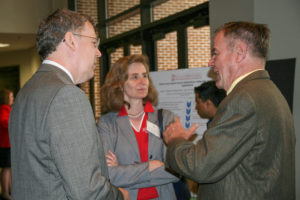 The reception, held Thursday, March 17, at the UGA Tifton Campus Conference Center, recognized 11 current students primarily from graduate programs in the Warnell School of Forestry and Natural Resources and CAES, according to Lindsay Boring, director of the Joseph W. Jones Ecological Research Center in Newton, Ga. “The objective was to emphasize the importance of graduate education in supporting the land-grant mission of the University of Georgia.”
The reception, held Thursday, March 17, at the UGA Tifton Campus Conference Center, recognized 11 current students primarily from graduate programs in the Warnell School of Forestry and Natural Resources and CAES, according to Lindsay Boring, director of the Joseph W. Jones Ecological Research Center in Newton, Ga. “The objective was to emphasize the importance of graduate education in supporting the land-grant mission of the University of Georgia.”
Boring added that the Jones Center jointly supports five of the students who participated.
“These students conduct groundbreaking research, and it’s very hands-on research. They’re out in the field, out in the forests doing research,” West said. “To have this celebrated here, to give it a higher visibility in South Georgia and to have three deans and the provost in attendance tells us they take this very seriously.”
—JOE WEST, ASSISTANT DEAN OF THE UGA TIFTON CAMPUS
All of the student-scientists presented their research projects and spoke with invited guests about their work.
Among them was Shannon Parrish, who is pursuing a master’s degree in crop and soil sciences from CAES. Her research focuses on cotton’s sustainability in Georgia.
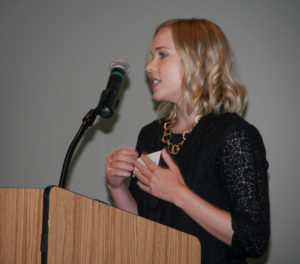 “As a graduate student, being able to present research (that) you have worked on is always exciting. With each presentation, I look forward to educating others on the importance of determining cotton’s sustainability to Georgia,” Parrish said. “I hope everyone I spoke to comes away from our encounter with an understanding of how vital cotton is to the state and the need for documenting the crop’s environmental footprint.”
“As a graduate student, being able to present research (that) you have worked on is always exciting. With each presentation, I look forward to educating others on the importance of determining cotton’s sustainability to Georgia,” Parrish said. “I hope everyone I spoke to comes away from our encounter with an understanding of how vital cotton is to the state and the need for documenting the crop’s environmental footprint.”
Other UGA graduate students at the event and their areas of study include:
Kiran Gadhave (CAES), studying plantvector- virus interactions.
Alex Jackson (Warnell School), studying the cultural and economic impact of quail hunting in south Georgia.
James Johnson (Warnell School and the Jones Ecological Research Center), studying the use of infrared cameras in estimating white-tailed deer population parameters and behavioral patterns.
Nicholas Marzolf (Odum School), studying the rapid expansion of an invasive snail and the implications for water quality in a novel ecosystem.
Cara McElroy (Odum School), studying wetland connectivity through amphibian ecology.
Grace Melo (CAES), studying global changes in harvested area for corn, sugarcane and oilseeds. Is fuel production the main incentive?
Haley Ritger (Warnell School), studying the interactions between subcortical insects and longleaf pine physiology under various prescribed fire regimes.
Justin Shealey (CAES), studying chemical management of black shank disease in Georgia.
Luellen Swayzer (CAES), studying the evaluation of variations in zoysiagrass and centipedegrass.
Alicia Wilson (Warnell School), studying the impacts of extreme hightide events on sea turtle nesting along the Georgia barrier islands.
The event focused on research pertaining to forestry, natural resources, agriculture and grant-funded projects that are key in sustaining the economic health of south Georgia.
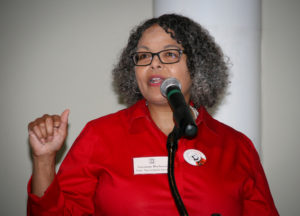
“I was excited about this opportunity to showcase the important contributions of our graduate students to the land-grant mission. They are uncovering molecular secrets, developing next-generation technologies and using cutting-edge approaches to disseminate their findings and empowering landowners, corporations and other stakeholders in south Georgia,” said Suzanne Barbour, dean of UGA’s Graduate School. “Their contributions to the land-grant mission, and thereby the economy of south Georgia, cannot be overestimated.”
Barbour was one of three UGA collegiate deans in attendance. She joined Sam Pardue of CAES and Dale Greene of the Warnell School. Also in attendance was Pamela Whitten, UGA senior vice president for academic affairs and provost, who discussed UGA’s Signature Research Themes and their relationship to the land-grant mission.
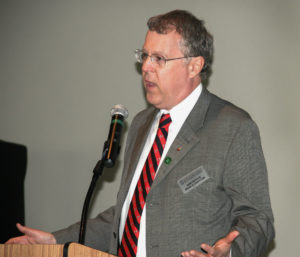 “We are excited to share the wide range of graduate field studies in natural resources and forestry that are focused on South Georgia,” Greene said. “It’s also a great opportunity to showcase the collaboration between the Warnell School and CAES as well as welcoming Dean Pardue.”
“We are excited to share the wide range of graduate field studies in natural resources and forestry that are focused on South Georgia,” Greene said. “It’s also a great opportunity to showcase the collaboration between the Warnell School and CAES as well as welcoming Dean Pardue.”
This week marked Pardue’s first as the dean and director of CAES and his first visit to south Georgia as the new CAES dean. The UGA administrators’ attendance solidified the event’s importance, according to Joe West, assistant dean of the UGA Tifton Campus.
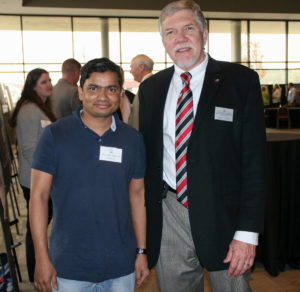 “These students conduct groundbreaking research, and it’s very hands-on research. They’re out in the field, out in the forests doing research,” West said. “To have this celebrated here, to give it a higher visibility in South Georgia and to have three deans and the provost in attendance tells us they take this very seriously.”
“These students conduct groundbreaking research, and it’s very hands-on research. They’re out in the field, out in the forests doing research,” West said. “To have this celebrated here, to give it a higher visibility in South Georgia and to have three deans and the provost in attendance tells us they take this very seriously.”








